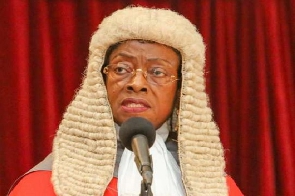General News of Thursday, 3 October 2019
Source: classfmonline.com
Stop paying 'thank you' money to judicial officers – CJ warns judges
Ghana’s Chief Justice, Sophia A. B. Akuffo, has admonished judges in the country against paying “thank you” money to judicial officers in the performance of their duties.
According to Justice Akuffo, the practice is detrimental to the fight against corruption within the Judiciary and the Judicial Service.
Justice Akuffo noted that any "thank you" must not go beyond words.
Speaking at the opening of the 37th Annual General Meeting of the Association of Magistrates and Judges of Ghana on Wednesday, 3 October 2019, Justice Akuffo said: “I wish to use this opportunity to speak briefly about a development I consider insidious and detrimental to our fight against corruption within the Judiciary and the Judicial Service. I want to address the practice where some Judges pay 'thank you money' to Judicial Officers in the performance of their lawful duties.
“I know this practice has persisted over a long period, but I believe it is time for us to put a stop to it as Judges, as it contributes to the culture of corruption in our institution. Judicial Service Staff, be they Directors, Senior or Junior Staff, are paid by the State to undertake their official duties. Any 'thank you' must not go beyond the verbal, and that should be it!”
Touching on the theme: ‘Judges, Our Health’, Justice Akuffo called for support systems for the Bench.
She noted that while judges bear individual responsibility for devising creative ways of maintaining their sanity in the face of the overwhelming challenges of their calling, it will be prudent that effective support systems are established among judges that will provide the environment for them to overcome these work-related pressures that undermine their health and well-being, and allow them to continue to thrive and perform optimally.
“As we know, the mere absence of sickness or disease is no indication of good health and hence, a holistic view of wellness is necessary if we are to achieve the ends of this objective,” she stated.
She further explained that: “The support system I have mentioned can also be used as an avenue to drive Mentorship Programmes amongst us. I have come to the realisation that interactions amongst us Judges, is mostly limited to members of the same level. The few times where members get to interact with others of another level are during gatherings, such as this. This lack of effective interactions amongst members of the different levels of the Bench is a great source of concern to me because it is a bar to us learning from each other to help improve on our individual abilities, as well as in the service we render to our dear country as a collective body.
“This again has resulted in some members of the Lower Bench getting nervous whenever they get the opportunity to meet up with Superior Court Judges. It is for this reason that I believe the support system could serve as a Mentorship Programme as well. Experienced members of the Superior Court Bench should willfully take on members of the Lower Court Bench under their tutelage to impart and groom them to become better at their jobs. This I believe will serve as a bridge to close the gap between the members of the Bench with the added advantage of imparting excellence into the next generation. Mentors should be proactive to identify and reach out to prospective mentees and mentees should be humble to learn and be able to articulate any challenges they encounter and need help with. Let us deliberately build a strong support system for the betterment of us all.”













